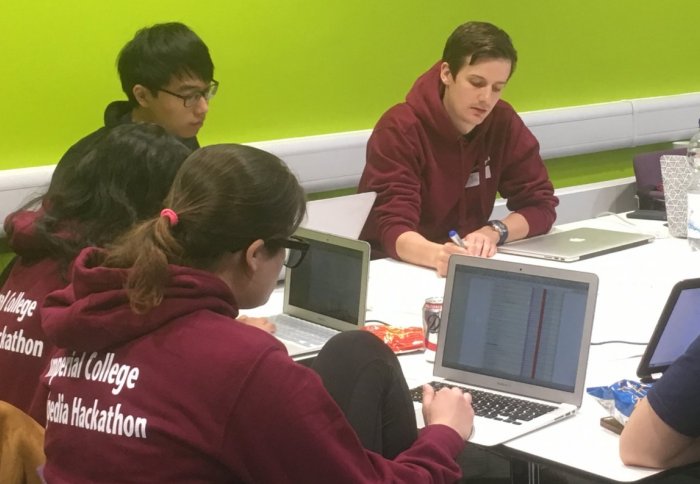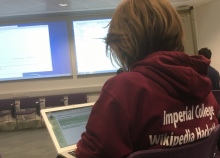Imperial's School of Medicine hosts Wikipedia health hackathon

Imperial medics work with WikiProject Medicine to bring online health resources up to date
Written by Dorrit Pollard-Davey, Imperial College School of Medicine
Imperial College School of Medicine recently hosted a ‘Hackathon’ event, working intensively across the evening of Friday 11 and through Saturday 12 November with WikiProject Medicine to improve the content of basic science and healthcare related Wikipedia pages, in the fields of Cardiology and Respiratory Science.
The use of Wikipedia in higher education is a polarising subject, with fervent advocates and critics, but its importance globally cannot be ignored.
– Dr James Moss
Physiology Teaching Fellow
Funded by an INSPIRE grant from the Academy of Medical Sciences, Imperial students and staff collaborated with academics, librarians and technologists to edit and produce up to date content to add to Wikipedia’s online health resources, increasingly relied on worldwide by both healthcare professionals worldwide and the general public.
Wikipedia is now established as the most popular health-content website in the world, with up to 80% of the public looking up medical information online, and ranks as the 7th most-visited website globally.
Healthcare professionals in the developing world need access to reliable, up to date information and are turning increasingly to Wikipedia to provide it, so development projects like these are vital in the effort to maintain its dissemination. Closer to home, as the UK moves into winter and with the recent publication of the Commons Health Committee’s report on winter planning highlighting, ‘Accident and Emergency departments in England are managing unprecedented levels of demand,’ Wikipedia’s online resources are reducing stress on doctors as patients are able to diagnose common ailments before booking an appointment or making unnecessary trips to A&E.
 The project is modelled in part on a similar Wikipedia page grading project run at the University of California in 2013, where students aim to make Wikipedia articles more detailed and substantial in order to give them a higher page grading. A Hackathon is a model developed in the technology industry bringing together technologists, developers and industry experts to create a piece of software over short period of time. Wikipedia have since applied this concept with great success, changing it to develop knowledge rather than software, and incorporating students and academics with the goal of producing a well-informed, well-referenced and publicly-available resource.
The project is modelled in part on a similar Wikipedia page grading project run at the University of California in 2013, where students aim to make Wikipedia articles more detailed and substantial in order to give them a higher page grading. A Hackathon is a model developed in the technology industry bringing together technologists, developers and industry experts to create a piece of software over short period of time. Wikipedia have since applied this concept with great success, changing it to develop knowledge rather than software, and incorporating students and academics with the goal of producing a well-informed, well-referenced and publicly-available resource.
“The use of Wikipedia in higher education is a polarising subject, with fervent advocates and critics, but its importance globally cannot be ignored”, says Dr James Moss, Physiology Teaching Fellow at Imperial College, who took part in the event.
“This Hackathon gave two teams the chance to see what it takes to contribute and enhance articles. This was undoubtedly more arduous than any of us anticipated; nevertheless, we managed to make our own small contributions to the world’s most popular online encyclopaedia.”
Participants left the event keen to take part again, saying their highlights were ‘understanding the importance of contributing to medical information online’ and ‘teamwork’, alongside ‘developing essential research and appraisal skills’.
Readers can view how the event progressed by searching for the hashtag #icsmwikihack on Twitter and across social media platforms, and follow the links below to see the updated Wikipedia pages.
Article supporters
Article text (excluding photos or graphics) © Imperial College London.
Photos and graphics subject to third party copyright used with permission or © Imperial College London.
Reporter
Mr Al McCartney
Faculty of Medicine Centre